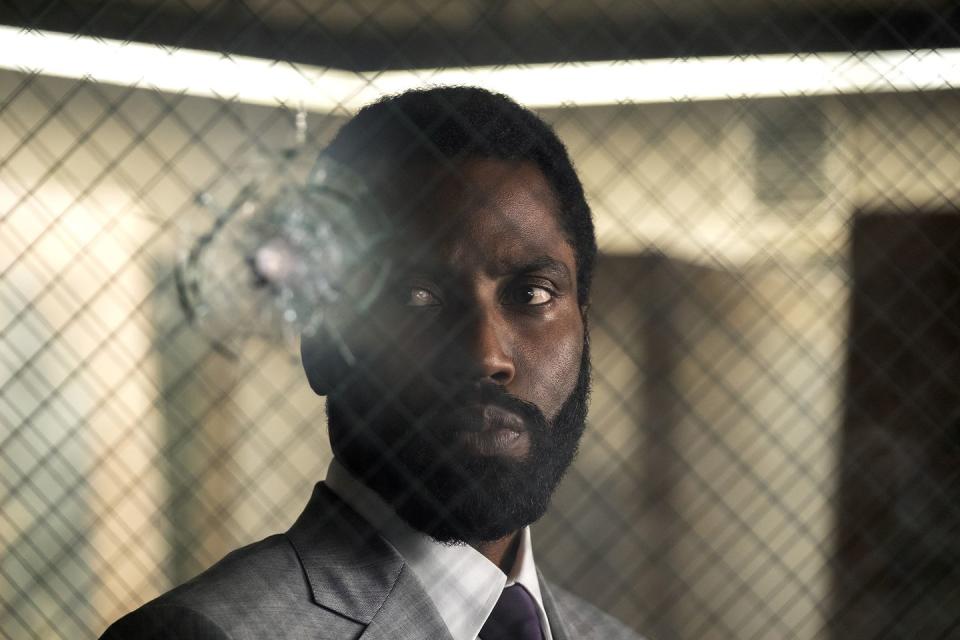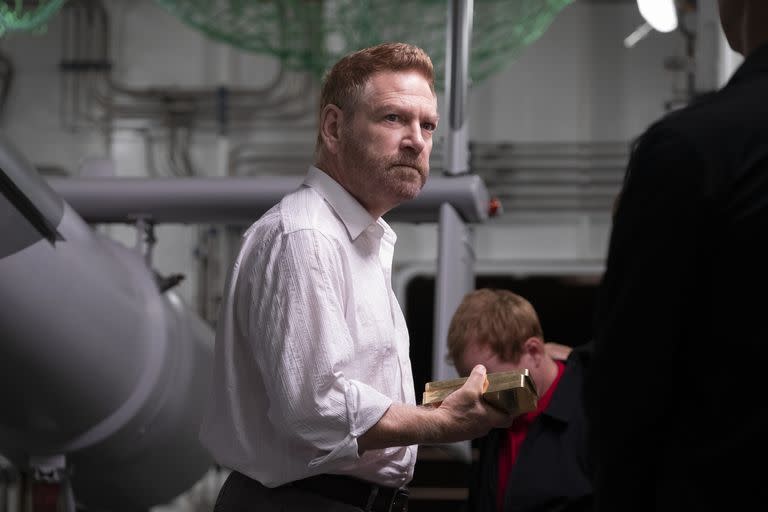Tenet explained: Delving into the ending of Christopher Nolan's spy thriller

Tenet ending spoilers follow.
Christopher Nolan's Tenet is now available on Netflix UK, while Oppenheimer is still available in cinemas.
For many, it will likely be their first experience of Nolan's trippy sci-fi and they'll likely be as close to understand it as everyone who saw it at the cinema were. It's a movie that requires repeat viewings to fully get all the mysteries and plot in order.
When even lead star John David Washington isn't clear on everything, despite starring in the movie and reading the script, then you know it's not an easy watch.
But that just means there's plenty more to savour and read about once you've seen it, such as this article where we'll outline the plot and answer the questions you'll likely have from the movie after one watch – or even several watches.

Unfortunately, we're not physics experts, so we won't even pretend to explain the science behind Tenet's mindbending time inversion concept. What we will do is outline it in layman's terms as to how it works within the world of Tenet.
Needless to say, there are major spoilers ahead so don't read on if you haven't seen it yet.
(If you want to know more about Robert Pattinson's enigmatic Neil, the movie's link to the Sator Square and the significance of a Diet Coke, we're got you covered elsewhere.)

Tenet ending explained
After the prologue sees the Protagonist (Washington) decide to kill himself instead of give up his team, he's saved by a mysterious individual who welcomes him "to the afterlife", arming him with a single word: Tenet.
This new world he's found himself in is laid out in a conversation with Clémence Poésy's scientist. (Some people think she's actually the one who invented time inversion itself in the future, but that's a debate for another article.)
There are things that, instead of moving naturally forward in time, are moving backwards in time, including bullets. The fear is that an "inverted weapon" from the future could affect their past, say a nuclear weapon.
The Protagonist tracks these bullets to Andrei Sator (Kenneth Branagh) and uses Sator's abused wife Kat (Elizabeth Debicki) to engineer a meeting, in order to find out who Sator is working with.
He promises Kat that he'll get back some fake art that Sator is using to control Kat – she delivers a monologue about seeing a woman dive off the yacht as she returned, envying her freedom (remember this).

So along with the help of Neil (Pattinson), the Protagonist breaks into a free port in Oslo, Before he can do that though, he gets into a fight with a mysterious inverted individual who gets away (remember them though, it's important).
The Protagonist still gets his meeting with Sator though, by telling him he can help get the plutonium he wants. Sator doesn't trust him and cuts him out, so the Protagonist and Neil work to steal the plutonium before Sator can. A heist within a heist, if you will.
Sator still comes out on top though as he appears during the heist in an inverted car and threatens Kat's life to get the Protagonist to give up the plutonium. It turns out that Sator's team have been doing a "temporal pincer", moving forwards and backwards in time to the heist to ensure they know exactly how it'll all go down.
They do this through the use of a "time stile" (sent from the future, naturally) that allows Sator to invert himself (move backwards through time), but before he goes to get the plutonium from the past version of the Protagonist, he shoots Kat with an inverted bullet.
It's here when things get (even more) trippy. A military unit shows up, led by Ives (Aaron Taylor-Johnson), and it's revealed that Neil has always known more than the Protagonist and is part of the Tenet organisation.
But Sator wasn't after plutonium, it was actually part of an algorithm that will change the world's entropy, effectively putting it in reverse. If Sator uses it, it likely means the end of civilisation.

It turns out that Sator is actually working for people in the future where the world is so destroyed that they "have no choice but to turn back". A scientist made this algorithm to reverse the flow of time, but to stop it being used, she split it into nine pieces and hid it in the past.
The nefarious people in the future recruited Sator in his youth when his hometown was destroyed by a nuclear blast, using him to find all nine pieces and bring them all back together.
(But wait, if they kill their ancestors in the past, doesn't that mean they will cease to exist to, as the Protagonist puts it to Neil. It's the classic grandfather paradox and Neil's response is that the future doesn't care and is willing to give it a shot.)
To stop Sator and to save Kat's life, the Protagonist, Neil and Ives' team invert themselves and start moving back in time. The Protagonist is warned that he can't meet his past self and he needs special breathing apparatus as he's inverted, but "the world's not".
He's unable to stop Sator as the crashed car he saw earlier during the heist was actually his crashed car in his inverted pursuit. To give Kat time to heal, they make their way to Oslo, as they know there's another of the "time stile" machines there, knowing they can get in when they originally created the diversion.
Yes, you guessed it, the person the Protagonist fought was actually his future self.

Having gone through the machine at the free port, they're now in the past, but moving forward through time normally.
The problem is that Sator's algorithm plan is going to take place in the past. He's going to either bury it in his former hometown, or set off the algorithm, by exploding several bombs (it's not entirely clear). Either way, the result will be the algorithm will be activated, changing the entropy of the world and killing everyone.
Kat reveals that Sator is dying of terminal cancer, so using his fitness tracker as a dead man's switch, he plans to kill himself on his luxurious yacht when he knows his past self isn't there, activating the algorithm to destroy the world.
The Protagonist, Neil and Ives set out on a mission to lift the algorithm before the bomb explodes, while Kat heads to the yacht to stop Sator killing himself before they've succeeded.
A mind-bending battle follows where one half of the team is working backwards to the explosion and the other working forwards. The long and short of it is that with Neil's help, the Protagonist and Ives lift the algorithm in time, which is lucky as Kat decided to kill Sator just as they take it.
The woman that past Kat saw jumping off the yacht when she returned on that day was actually her future self after she had killed the future version of Sator.

Unfortunately, for the mission to succeed, the Protagonist realises that Neil is killed when he goes backwards to help them. Once they've escaped with the algorithm, he tries to persuade Neil to not go back, but as he puts it: "What's happened, happened."
Before he goes though, Neil reveals that it's actually the Protagonist who recruited him for Tenet, teasing that "we get up to some stuff". We don't know exactly what, but we do know one of the events saw Neil save the Protagonist back at the opera, due to the fact we see Neil's red string in the prologue.
It's things that are in the Protagonist's future, but Neil's past as the whole 'save the world' mission has been a "temporal pincer". Neil and others have been working back towards it, while others like the Protagonist have been moving forward to it.
And it was all set up in the future by the Protagonist, along with the Tenet organisation itself (presumably).
It's the central concept of Tenet. This isn't a case of changing the past or future, everything has all been a part of the same loop. Sator was never likely to succeed in his mission because he never did.

Whether it's a world in which things can be changed remains to be seen.
After they go back in time to Oslo, the Protagonist tries to get Priya – the arms dealer who told his past self about Sator and the 'plutonium' – to not tell him about it so that Sator would never get his hands on the final algorithm piece.
But she refuses, so we don't know if that could have changed events. In the final moments of the movie, the Protagonist stops Priya from killing Kat to clear up loose ends, but he's only there because of something he told Kat in the past.
Is that something that always happened? Or did the Protagonist alter the future by getting Kat to phone him if she ever thought she was in danger?
It's certainly cleaner for it to be a world where everything happens as it always has, even if you're not entirely clear about it at the time.
As the Protagonist puts it to Neil before they set off to stop Sator: "Doesn't us being here now mean it never happened?"
Tenet is now available on Netflix UK.
You Might Also Like

 Yahoo News
Yahoo News 
